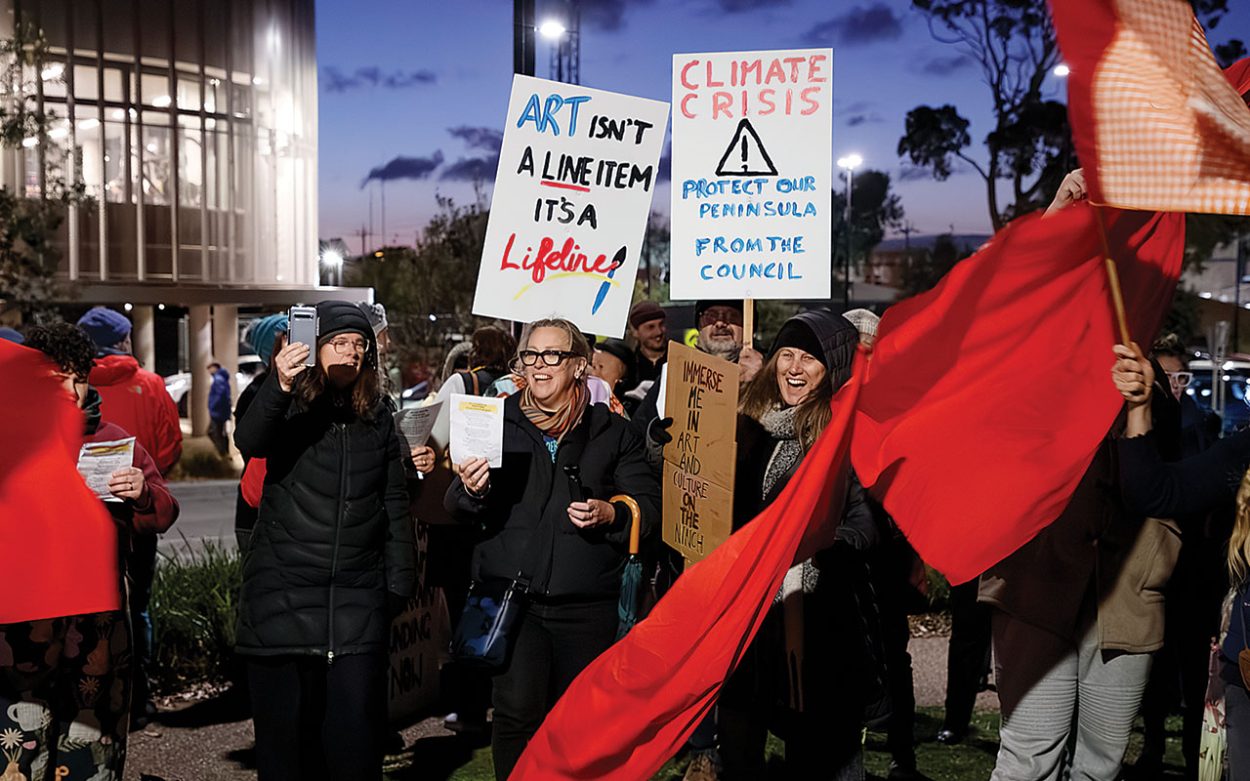MORNINGTON Peninsula Shire councillors have adopted a record budget of $326.3m amid growing community angst over cuts to arts, culture, and environmental programs.
Deputy mayor Paul Pingiaro conceded some “tough decisions” were needed to move the council forward, noting “there was a lot of things that we can always do better – but moving forward, that’s what we’ll do as an organisation”. “What we have in front of us is a budget that will hopefully deliver quite a few savings – they’re unrealised at the moment, the work’s getting done, and if the work gets done, we can open up to new possibilities for this council to fund,” he said.
Among the priorities will be $13.1m for road maintenance – a 72 per cent increase on last year, and a further $500,000 will be allocated to community safety and crime prevention.
Key themes featured include protecting the Green Wedge, enhancing coastal infrastructure, improving environmental resilience, upgrading stormwater systems, and increasing support for families and young people. Big wins will also be delivered through the Capital Works Program, totalling $50.7m.
Among the projects include the $8.375m – Emil Madsen Reserve Pavilion (soccer/netball); $2.45m – Peninsula Trail: Baxter to Somerville; $1.287m – Netball courts in Sorrento; $890k – Dromana Bowls Club subsidence rectification; $900k – Canadian Bay car park; as well as $407k – Birdrock Beach Access restoration, and $297k – Beleura Cliff Path drainage and access works.
Five million dollars will also be invested in climate and environmental initiatives, as well as $4m in grants, sponsorships and subsidies to build a stronger community.
Another key feature of the budget is the launch of the Visitor Economy Partnership – a $200,000 initiative co-funded with the state government. This includes $2m already secured for The Briars redevelopment, as well as unlocking access to major state and federal tourism funding, and continuing to support local events, businesses, and tourism growth.
Mayor Cr Anthony Marsh said, “This is a community-building budget that truly reflects what our community told us matters most – safer roads, support for families and young people, better local facilities, care for our natural environment, and strong, inclusive neighbourhoods”.
The budget, which was adopted at the council’s 17 June meeting, was however met with some criticism and tense moments after Cr Max Patton and Cr David Gill had tried to introduce motions to revisit the cuts to arts, culture, environment including funding for the Dolphin Research Institute, heritage, and climate action grants and subsidies following an outcry from the community. But these were rejected by Marsh on the basis that they went against local governance rules when previous decisions had been made.
“It’s asking to re-prosecute a formal decision of council from several weeks ago. You cannot table motions that contradict or try to unwind a formal decision without following the process and the governance rules,” he said. His response prompted a concerned reaction from the public gallery, with Marsh interjecting before calling for a brief adjournment. “I’m sorry I’m not going to debate with the gallery on this, it’s very straightforward rules that have been in place for decades; we do not unwind decisions on the fly because the council doesn’t like the outcome of a formal vote, so I’m not going to accept that motion,” he said.
Cr Kate Roper was, however, successful in finding some compromise after putting forward a motion to consider using any surplus funding at the mid-year budget for arts and culture creative grants, the Willum Warrain reconciliation program, and the Dolphin Research Institute’s education program. “These groups would be dependent on council of deliberations … if there’s no surplus, this won’t happen, but I ask fellow councillors to consider the distress in our community over recent changes in funding and ask you can at least consider looking at these in the mid-budget,” she said.
While Roper’s motion was approved unanimously, voting against the budget was councillors David Gill, Patrick Binyon, and Max Patton. Patton said, “it’s not enough for our community… while there’s been all talk about this 3000-odd number of budget submissions, we’ve had almost that number in a petition rejecting the decision of council”.
An online petition called “Save our arts” that has 2831 signatures, said the cuts of $480,000 “would devastate the Mornington Peninsula’s artistic community, which makes an essential contribution to the peninsula’s cultural identity, social well-being, tourism, education, and employment”.
Later in the same meeting Patton also tried to move two notices of motions relating to arts funding and the council’s decision to scrap its Climate Emergency Declaration and Climate Emergency Plan – but these too were blocked by the mayor as they again “seek to undermine former decisions of council”.
Speaking on the budget, Binyon said he could not support it as believed that “authentic engagement” with the community had not occurred. He said there was an uneven representation from all demographics across the shire, with 1.5 per cent of people aged 30-39 contributing feedback, and 19-29 years (less than 1.5 per cent). “Face-to-face is consultation is key; being on the front foot is critical,” he said.
Roper said the community had “reacted loudly” to the draft budget, and while she was “not completely happy with the process or the result of the budget, but I will be voting for this tonight because that’s the only one we’ve got”.
Pingiaro said the council had a $15m asset renewal gap, and “the unfortunate reality is some tough decisions were required to be made … this is about moving forward and putting council on the right point”.
First published in the Mornington News – 24 June 2025



